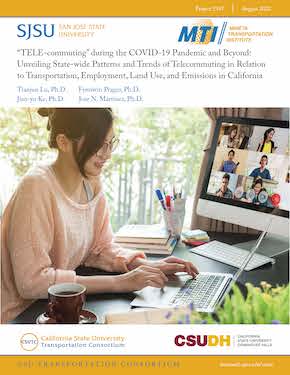- 408-924-7560
- mineta-institute@sjsu.edu
- Donate
“TELE-commuting” During the COVID-19 Pandemic and Beyond: Unveiling State-wide Patterns and Trends of Telecommuting in Relation to Transportation, Employment, Land Use, and Emissions in California
Telecommuting, the practice of working remotely at home, increased significantly (25% to 35%) early in the COVID-19 pandemic. This shift represented a major societal change that reshaped the family, work, and social lives of many Californians. These changes also raise important questions about what factors influenced telecommuting before, during, and after COVID-19, and to what extent changes in telecommuting have influenced transportation patterns across commute modes, employment, land use, and environment. The research team conducted state-level telecommuting surveys using a crowd-sourced platform (i.e., Amazon Mechanical Turk) to obtain valid samples across California (n=1,985) and conducted state-level interviews among stakeholders (n=28) across ten major industries in California. The study leveraged secondary datasets and developed regression and time-series models. Our surveys found that, compared to pre-pandemic levels, more people had a dedicated workspace at home and had received adequate training and support for telecommuting, became more flexible to choose their own schedules, and had improved their working performance—but felt isolated and found it difficult to separate home and work life. Our interviews suggested that telecommuting policies were not commonly designed and implemented until COVID-19. Additionally, regression analyses showed that telecommuting practices have been influenced by COVID-19 related policies, public risk perception, home prices, broadband rates, and government employment. This study reveals advantages and disadvantages of telecommuting and unveils the complex relationships among the COVID-19 outbreak, transportation systems, employment, land use, and emissions as well as public risk perception and economic factors. The study informs statewide and regional policies to adapt to the new patterns of telecommuting.
TIANJUN LU, PHD
Dr. Tianjun Lu is an Assistant Professor in the Department of Earth Science and Geography at California State University, Dominguez Hills. He received his Ph.D. in Planning, Governance, and Globalization from Virginia Tech and was a Research Scientist at the University of Washington. Dr. Lu’s has published multiple papers in Transportation Research Part D: Transport and Environment, Environmental Science and Technology, and Science of the Total Environment. His scholarly contribution mainly falls into multidisciplinary fields including transportation planning, air pollution exposure assessment, data analytics, and community engagement. Dr. Lu has rich experience in developing nationwide air quality models funded by the US Environmental Protection Agency (i.e., air pollution exposure models in the continental US), community-level air quality project funded by the Minneapolis Department of Health, MN and CSUDH, and community-level field measurements and modeling work funded by US Department of Transportation. Dr. Lu is the principal Investigator on this project.
JIAN-YU (FISHER) KE, PHD
Dr. Jian-yu Ke is an Associate Professor in the Department of Information Systems & Operations Management at California State University, Dominguez Hills. He received his Ph.D. in Supply Chain Management from the University of Maryland and was a fellow at Massachusetts Institute of Technology. Dr. Ke’s recent works were published by Production and Operations Management (listed in Financial Times Top 50 Journals), Journal of Business Research, International Journal of Physical Distribution and Logistics Management, and Journal of Purchasing and Supply Management. Dr. Ke has 14 research publications during 2011-2022 and his research interests include global transportation strategies, global supply chain management, manufacturing strategies, and the alignment of supply chain strategy with industry characteristics. Dr. Ke was the principal investigator on a California state-funded project named “Achieving Excellence for California’s Freight System: Developing Competitiveness and Performance Metrics Incorporating Sustainability, Resilience, and Workforce Development.”
FYNNWIN PRAGER, PHD
Dr. Prager is an Associate Professor of Public Administration at California State University, Dominguez Hills, where he is Co-Director of the South Bay Economics Institute. Dr. Prager received his Ph.D. in Policy, Planning and Development from the University of Southern California, and undertook a post-doctoral appointment at the Center for Risk and Economic Analysis of Terrorism Events. With CSUTC, Dr. Prager served as PI for the “GO-Virtual Initiative,” which explores flexible workplace practices for traffic congestion reduction, economic development improvement, and various affordable housing choices in the Los Angeles area, and currently participates in a project related to California’s freight system competitiveness as a Co-PI. Dr. Prager’s relevant academic experiences include writing a Ph.D. dissertation on climate policy and emissions mitigation; publishing studies related to transportation systems and disasters, receiving the METRANS student of the year award; participation as regular reviewer and editorial board member of Transportation Review Part E; and experience of conducting surveys and a pilot evaluation study of major US CBP trade initiative.
JOSE N. MARTINEZ, PHD
Dr. Martinez is an Associate Professor of Economics and Chair of the Accounting, Finance, and Economics department at California State University, Dominguez Hills. He received his Ph.D. and Master’s degree in Economics from University of California San Diego. Some of his latest research focus on the use of remittances from Mexican migrants living in the U.S., the spatial contagion effects of crime at municipality level in Mexico, the economic impact of foreign-owned enterprises in Southern California, and the impact of economic uncertainty on stock markets in Latin America. As Co-PI, he has participated in multiple SB1 projects, including “GO-Virtual Initiative,” which uses flexible workplace practices to reduce traffic congestion and increase economic development in the South Bay Region of Los Angeles County, and California’s freight system competitiveness. His expertise focuses on labor economics, applied economics, and time series modeling.
-
Contact Us
San José State University One Washington Square, San Jose, CA 95192 Phone: 408-924-7560 Email: mineta-institute@sjsu.edu






